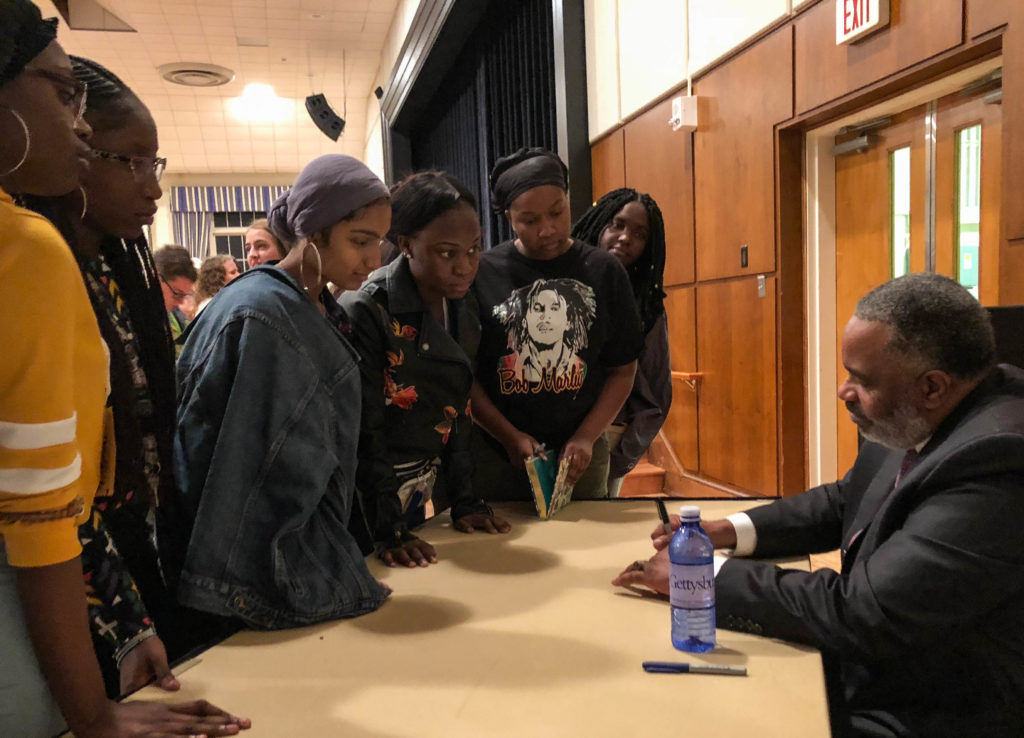First-Year Read Speaker Anthony Ray Hinton Shares His Story

First-year students gathered to hear Anthony Ray Hinton speak about his life (Photo Merlyn Maldonado/The Gettysburgian)
By Sam Shourds, Contributing Writer
On a hot July day in Alabama, the year 1985, a 29-year-old Anthony Ray Hinton was approached by two white police officers while mowing his mother’s lawn.
“I thought police officers were there to help you,” Hinton said, despite the tales he had heard of racist officers. His mother always taught him that police officers, wardens of the state, were there to keep people safe and promote justice.
This opinion changed when Hinton, a black man, was taken into custody by these white police officers, who did not seem phased by their prisoner’s complete lack of understanding of the charges against him.
The reason he did not understand was simply because Anthony Ray Hinton had never partaken in a crime of any sort, let alone the robbery, kidnapping, and attempted murder the police officers claimed he had committed. The reason the white police officers were unphased was a result of the simple fact that they did not care if the black man they had taken into custody was guilty at all.
Simple, right? An innocent, poor black man is taken into custody for a crime he did not commit — an honest mistake made by the Birmingham police department.
Was it also an honest mistake when Anthony Ray Hinton was instead convicted of two first degree capital murders in a court of law with no evidence placing him at the scene of the crimes and 10 or more peers to solidify his alibi? The white witness, white prosecutor, white judge, white jury, and black convict probably had nothing to do with the verdict that fated Hinton’s placement on death row, right? They were just doing their jobs, playing their parts as their superiors and society around them had taught.
As long as a black man was taken off the streets, they saw the trial as a victory. It didn’t matter that there was no evidence and that Hinton had passed a polygraph test. White community members praised their peers because “the worst killer in Alabama had been taken off the streets,” by the white prosecutor’s word.
Racism to this extent was thought to be a thing of the past back in the 80s, and even more so today, but racism cost Anthony Ray Hinton 30 years on death row in solitary confinement. Racism placed Hinton at the crime scene despite the fact that he was seen mingling among his community members at a church function while the crime was being committed.
For the first three years, the innocent man sat in a five-by-seven cell, full of hatred towards the men who put him there, knowing he was not a murderer.
“I didn’t speak to a soul,” Hinton said.
This is no way for any man to live, caged and anticipating his untimely death, 30 feet away from the chamber in which he is expected to take his last breath.
According to Hinton, “It costs two million dollars to execute someone.”
That’s two million dollars each for the 54 men and one woman who were executed while Hinton resided on death row, 110 million dollars in total.
Everyday, murderers, thieves, the mentally unstable are investigated, convicted, and placed on death row by our government. Everyday, millions of dollars are spent to murder these people legally.
Hinton posed the question, “Who investigates the politicians and the government?”
They get away with murder and the public praises them for it. They wrongly convict a man without consequences. Where’s the justice in this justice system? If an innocent man can lose 30 years of his life by the hands of the government without receiving one single apology or compensation, there is no justice.
One simple truth is that racism is not a thing of the past, and it is not without its consequences. Another is that our justice system is not always just, and the innocent and guilty alike face death from the likes of a corrupted system.
Hinton said, “All of my life, my mom taught me to fight,” and that’s exactly what he did when he hired Bryan Stevenson and subsequently was exonerated in 2015. But the fight didn’t stop there. Today, Anthony Ray Hinton tells his story around the world and encourages change through his powerful words.
Despite the hardships that placed him 30 feet from death, Hinton fights on and never goes a day without thanking the Lord for the moon he couldn’t see for 30 years.
